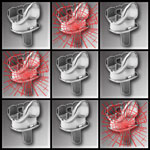Plaintiff Experiences Zimmer Failure in Just Three Years
 Zimmer knee replacement devices have been the subject of a number of allegations that claim that the knee replacement systems fail too quickly or cause unnecessary complications for a patient. Many patients claim that the devices don’t perform as well as the manufacturer, Zimmer Orthopedics, claims they will; this had led to a multitude of injuries experienced by patients. Now, a new Zimmer plaintiff is seeking compensation for her Zimmer knee failure.
Zimmer knee replacement devices have been the subject of a number of allegations that claim that the knee replacement systems fail too quickly or cause unnecessary complications for a patient. Many patients claim that the devices don’t perform as well as the manufacturer, Zimmer Orthopedics, claims they will; this had led to a multitude of injuries experienced by patients. Now, a new Zimmer plaintiff is seeking compensation for her Zimmer knee failure.
Plaintiff seeks help from Zimmer lawyer
The plaintiff, Mary Sippert, filed her lawsuit with the help of a Zimmer knee lawyer on the 9th of November, 2012, in the United States’ District Court for the Eastern District of Michigan. Her lawsuit joins the multidistrict litigation case currently proceeding in that court, which consolidates a number of federal lawsuits filed against drug maker Zimmer. Her husband has also filed suit as a co-plaintiff, claiming that his wife’s defective Zimmer knee replacement system caused him to suffer from loss of consortium as she dealt with these issues. As a couple they are seeking compensation based on claims of strict liability, negligence, negligent misrepresentation, breach of express and implied warranties, and a number of other counts.
Plaintiff Sipper claims that she originally received the Zimmer NexGen GSF CR-Flex one implant device in a surgery performed on her right knee on the 22nd of September, 2006. Just over three years later, the plaintiff required revision surgery in order to correct the problems she was experiencing with her device–even though, as marketed, the devices are meant to last for 15 years or longer without failure.
Patients join Zimmer litigation
Hundreds of patients who have dealt with complications stemming from their Zimmer knee replacement devices have filed lawsuits against the orthopedics manufacturing giant. There are currently multidistrict consolidations ongoing in courts in both Massachusetts and Illinois, processes that combine the pretrial information-gathering in similar lawsuits but retain the individuality of each case. Once pretrial processes are complete, cases in multidistrict litigation may be sent back to the courts in which they were filed.

